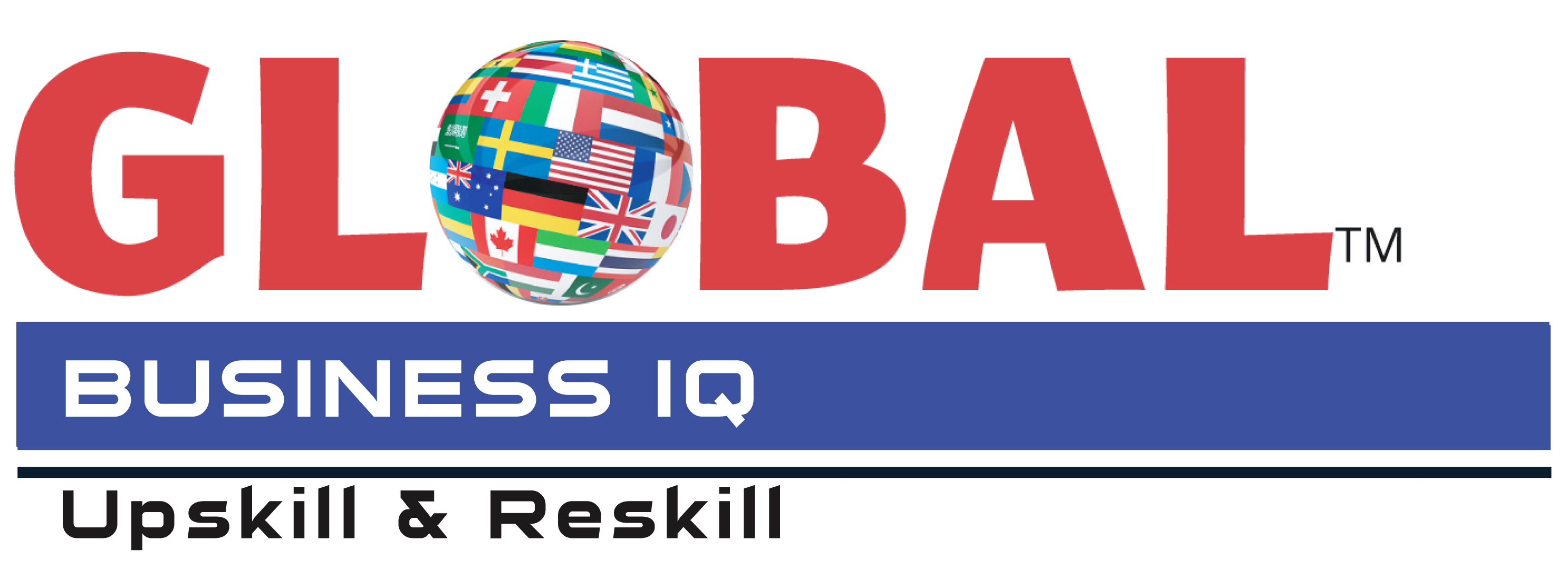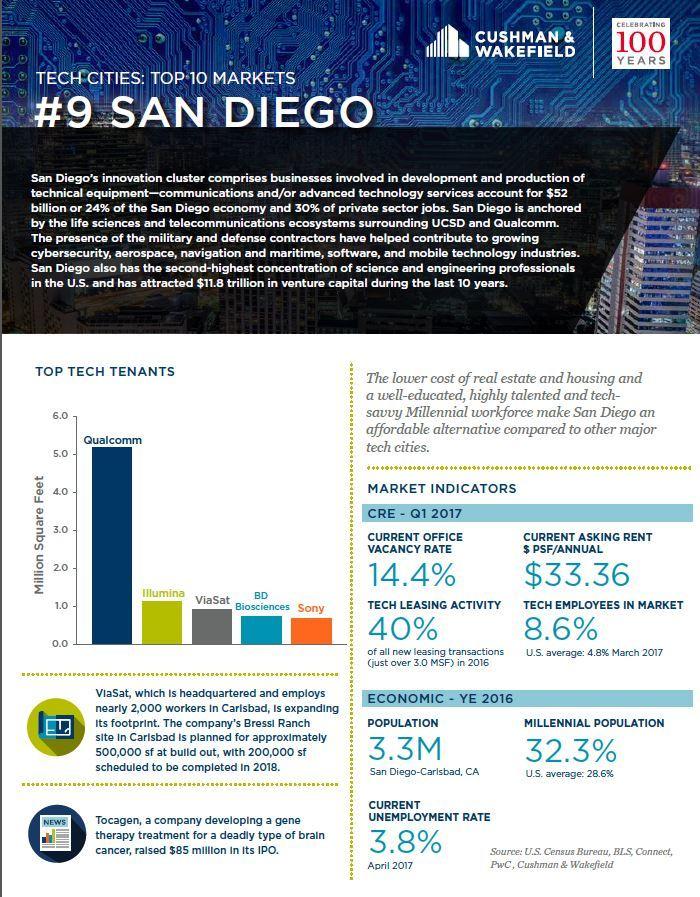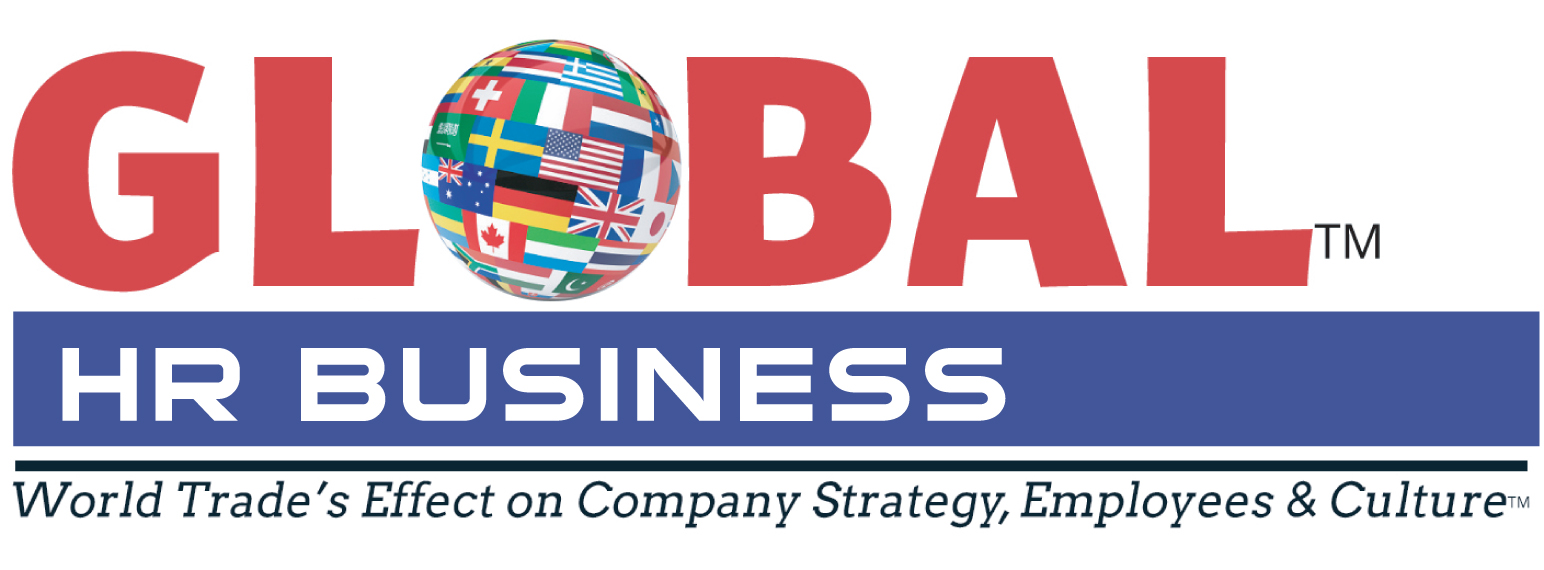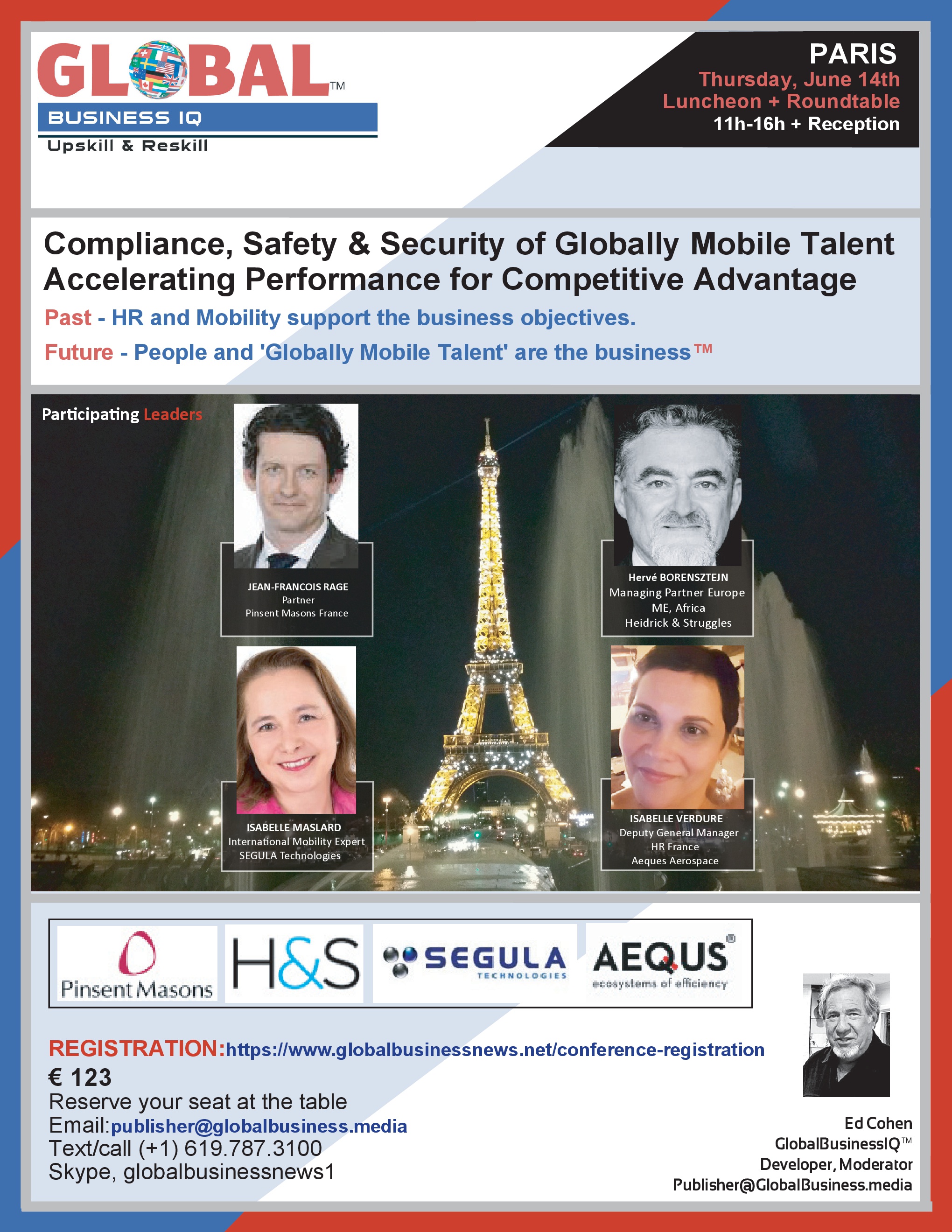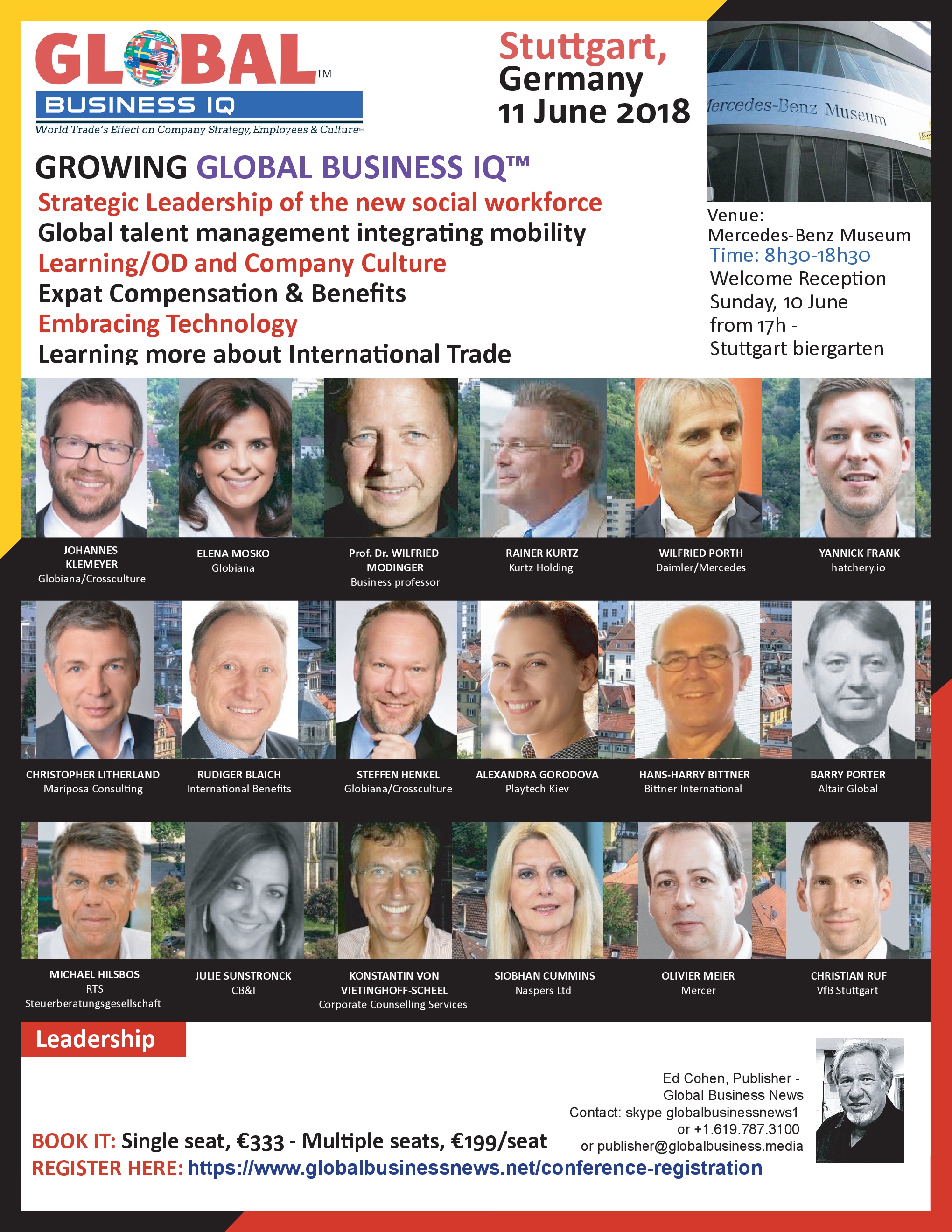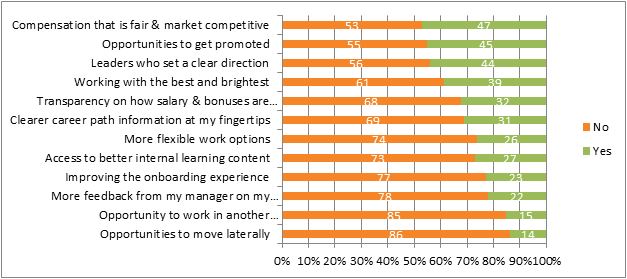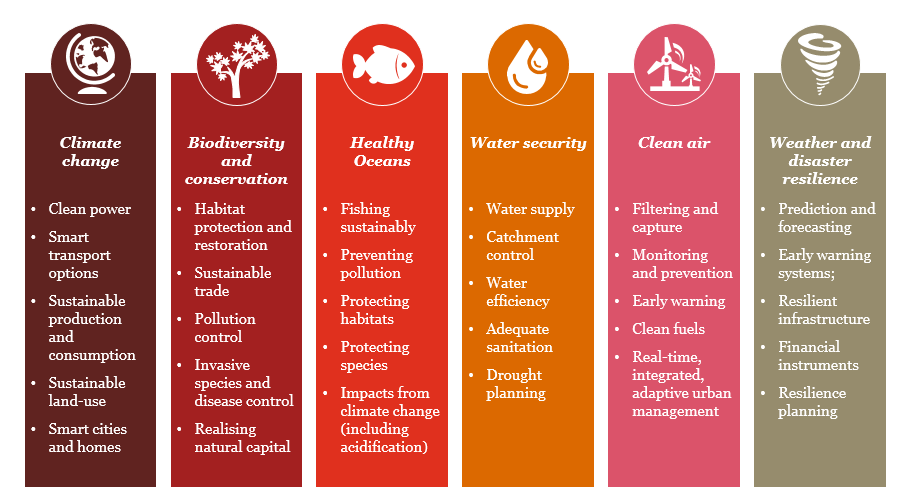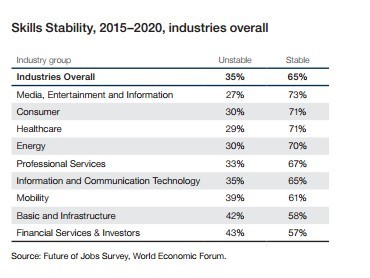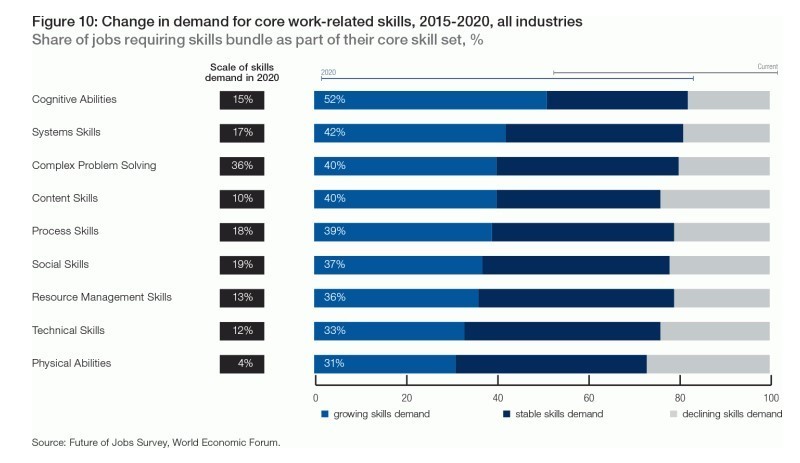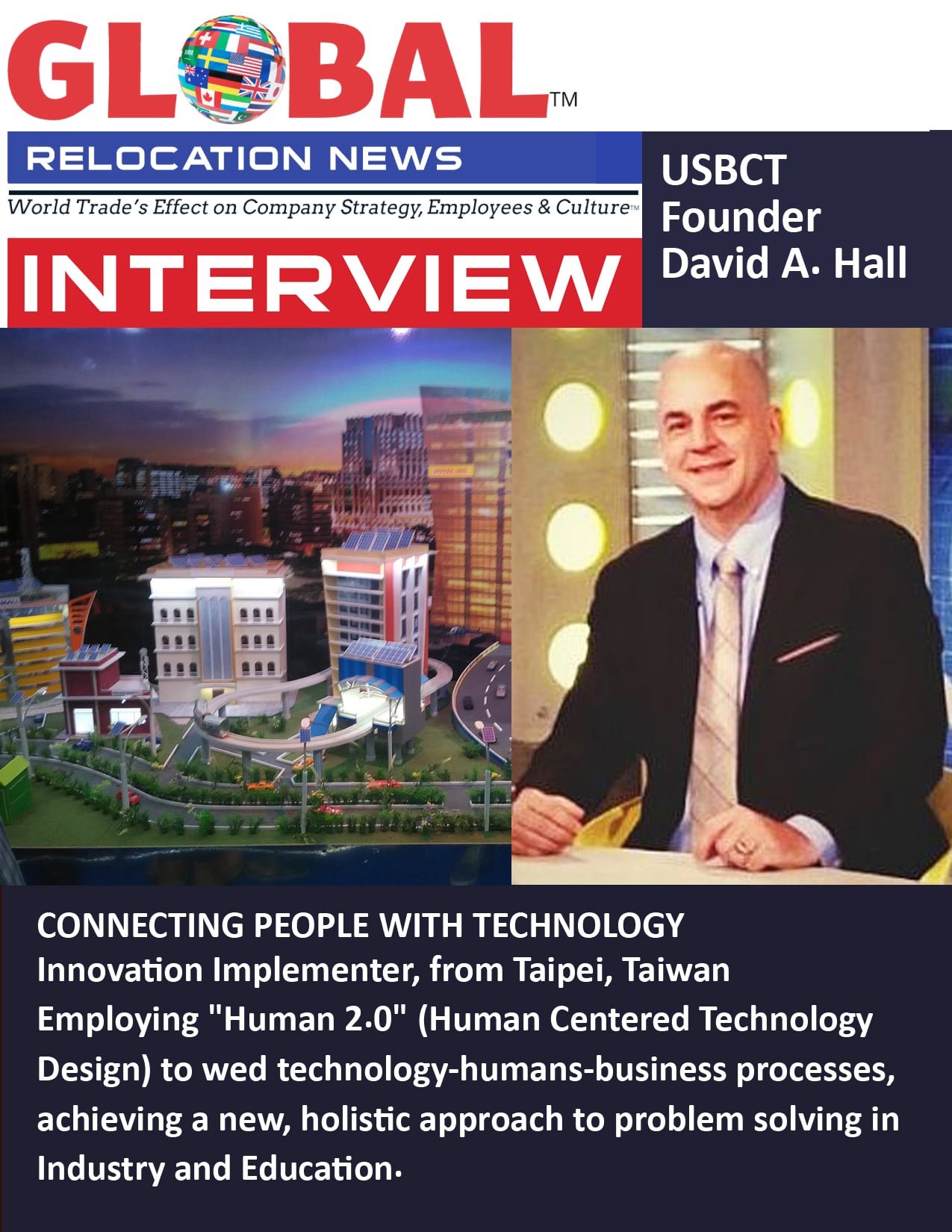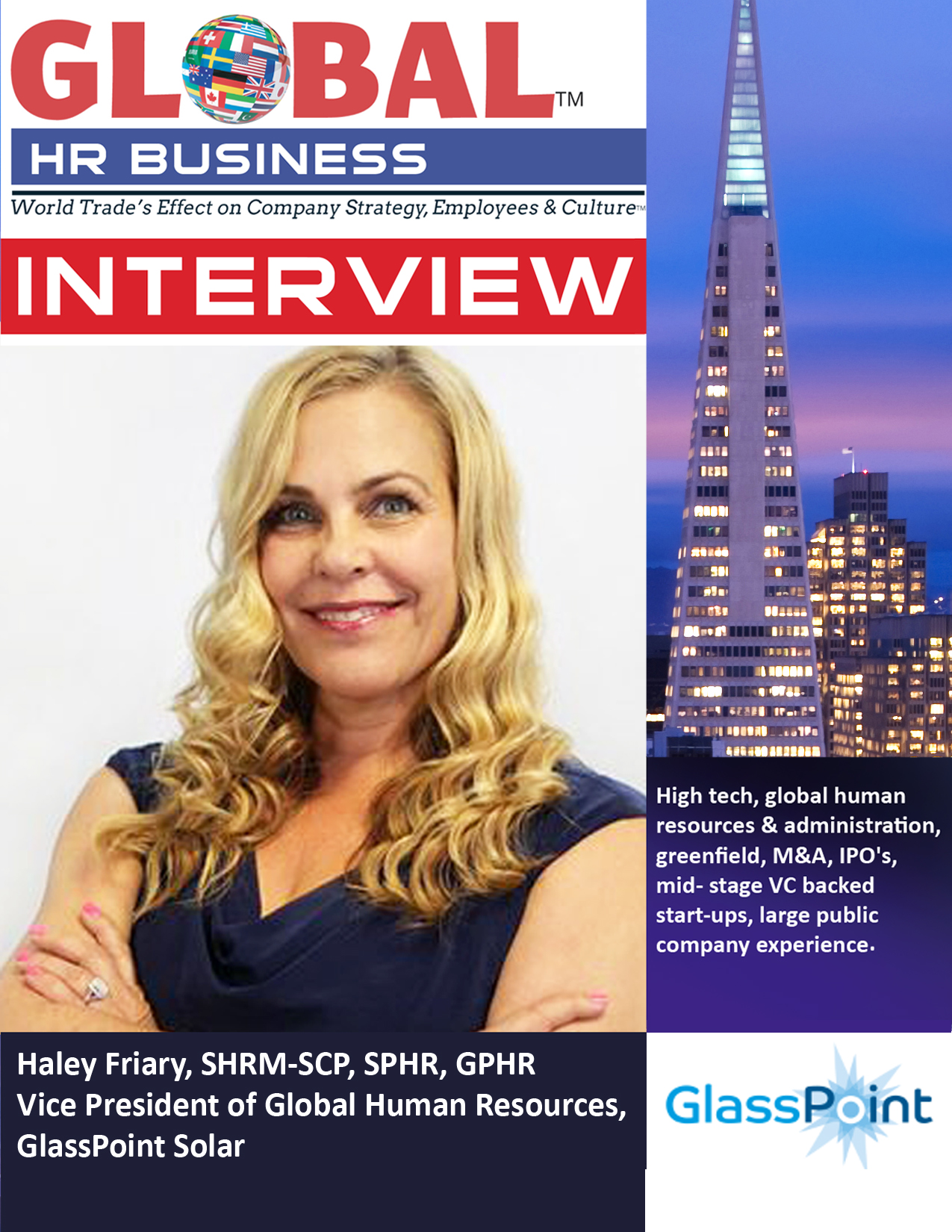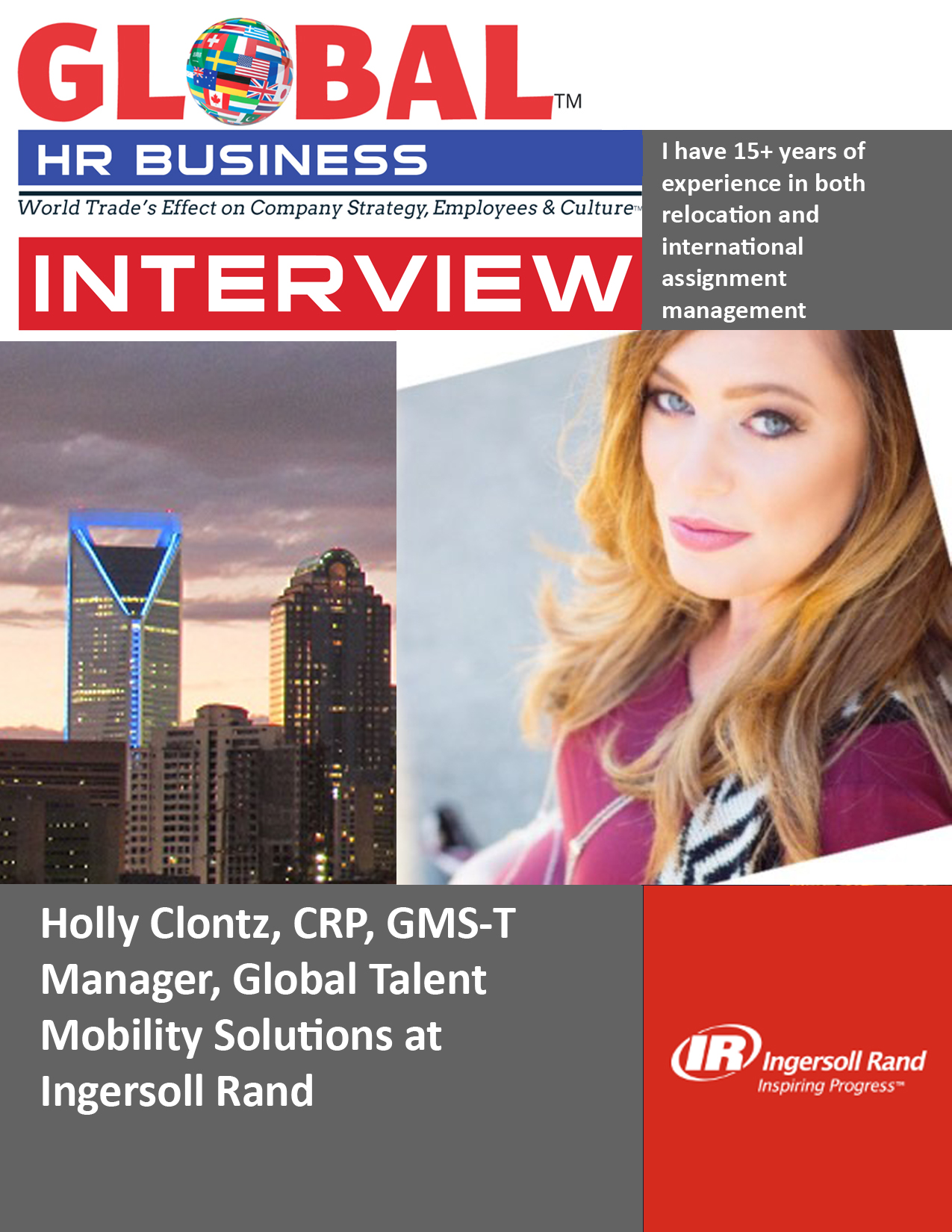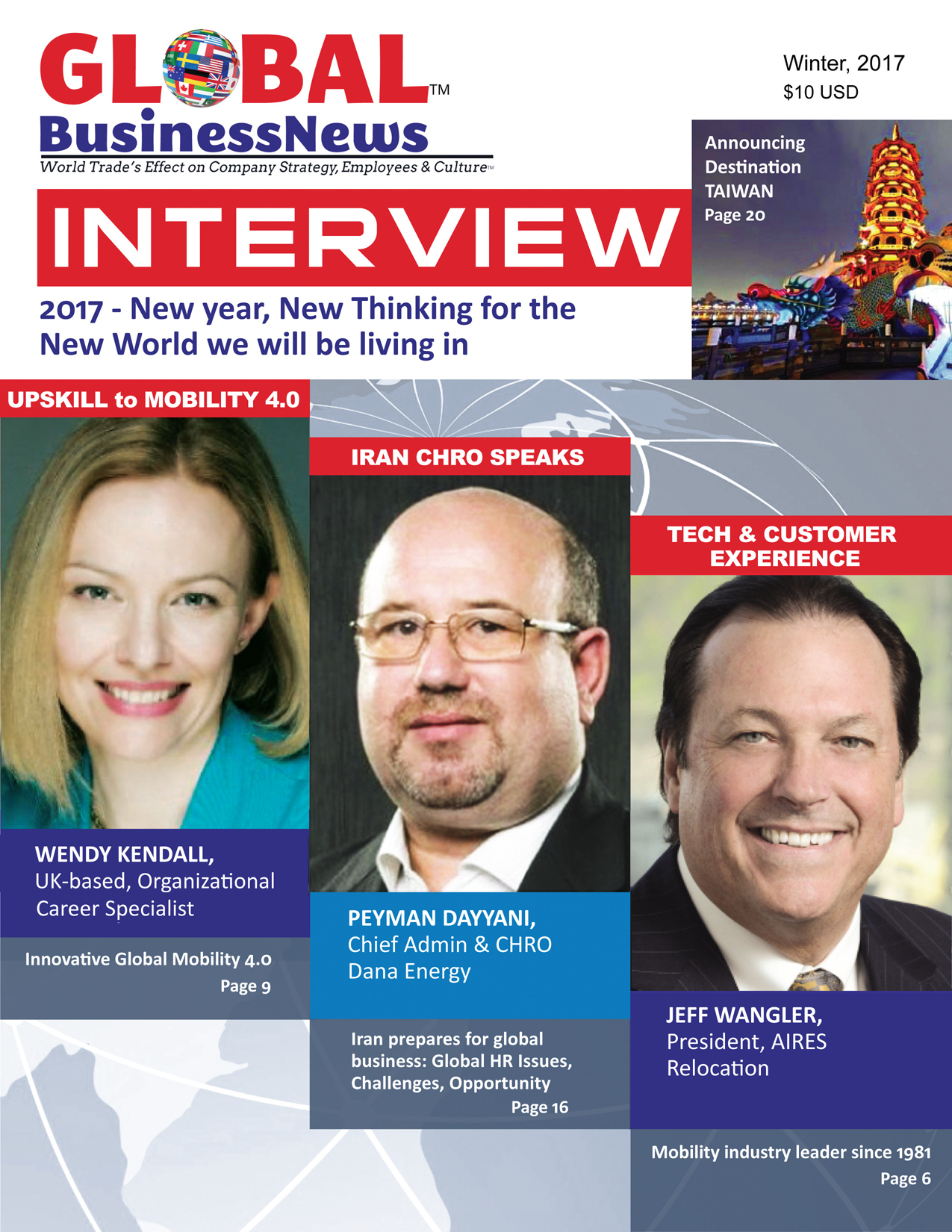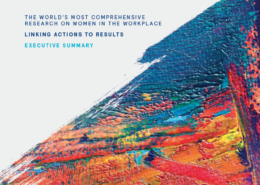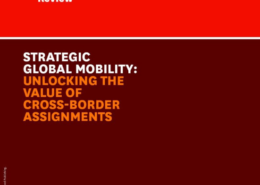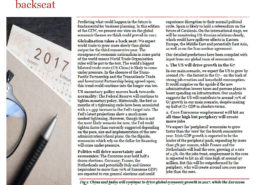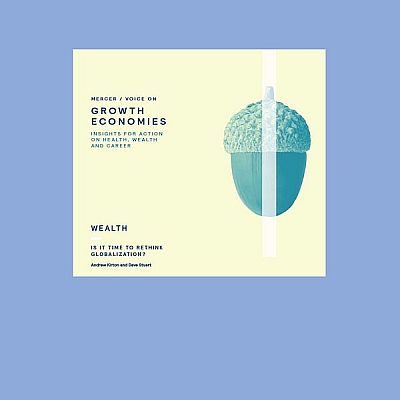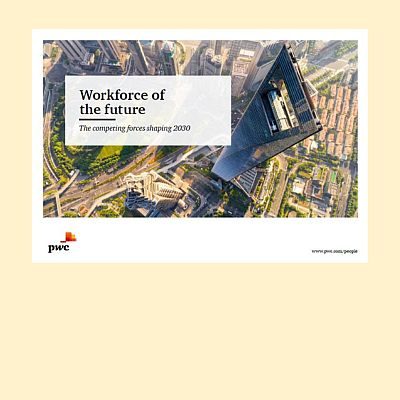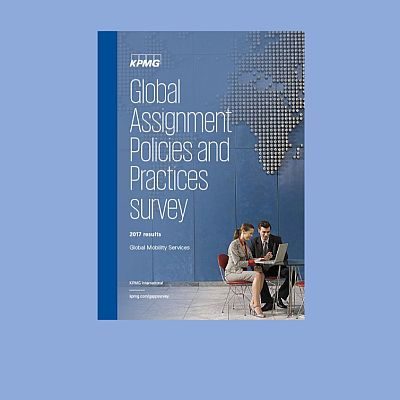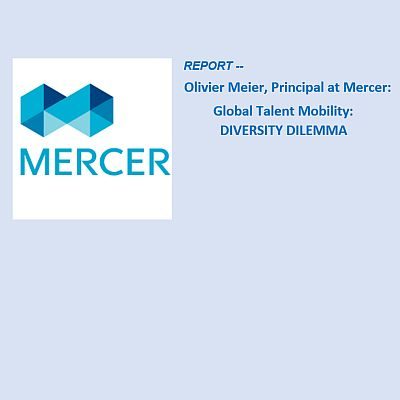INVITATION to COMPLIANT MOBILITY™ in San Francisco May 10 at SEYFARTH SHAW LLP click, review info
INVITATION to the 1st Congress on Global Leadership / Global Business IQ™ in Stuttgart on June 11th at the Mercedes Museum click, review info
SAN FRANCISCO May 10
Host sponsored by the international law firm
Angelo Paparelli, Partner
Dominic Hodson, Partner
INTERNATIONAL LABOR & EMPLOYMENT LAW 
Mahsa Aliaskari, Senior Counsel
INVITATION
1st Congress
Global Leadership
Global Business IQ™
Stuttgart Germany, June 11 …click
Mercedes Museum 
EUROPE Stuttgart; Nestle exec speaks Stuttgart June 11; Steinway HRD Stuttgart June 11; Helena Wennberg Stuttgart June 11; Naspers GM Head Stuttgart June 11; CB&I Stuttgart June 11; Mercedes keynotes Paris June14; PinsentMasons, intl law Paris June14; Heidrick & Struggles Paris June14; Aequs Pvt. Ltd. Paris June14; H&S Accelerates NextGen Paris June14; Brexit eco engine Stuttgart June11: Palladium Mobility Stuttgart June11; Altair Global cosponsors Stuttgart June11: FIDI Gen Mgr speaks Stuttgart June 11; Weichert Workforce Mobility
NEWS & INFO A-Pac audience surges 8% YTD KPMG sponsors SF May10, Boston July12, Miami Aug2 PWC at Toronto June27; host SHOPIFY SEYFARTH SHAW hosts SF May10, LA May31 May22 INNOVATION LaJolla; Argen,GreatCall,Dexcom July10 NY; DowJones, PricePoint, Globiana Panama LatAm conf FEB’19 developing Microsoft speaks; MIAMI 2Aug at KPMG Aug2 Miami, American Tower VP LatAm 31 May LA; host SEYFARTH SHAW LLP 31 May LA, EY on FUTURE Workforce San Francisco May 10; Synergy LaJolla May22, VictorAlasti Interconex San Francisco May 10; Suite America on faculty New audience, Welcome 西安三星电子研究所
Announcing:
May 22 SAN DIEGO INNOVATION
La Jolla Sheraton

COSPONSOR lunch & reception: add to registration $375; get speaking role, tabletop, great PR
MIAMI, AUGUST 2 — Mr Horace Porras, Vice-President Human Resources Latin America with American Tower Corporation speaks on HOW YOU WILL ACHIEVE ROI ON TALENT MOBILITY™. LEARN NOW… tune-into the GLOBAL RADIO Talkshow INTERVIEW with Mr Porras… click and learn …only Global Business News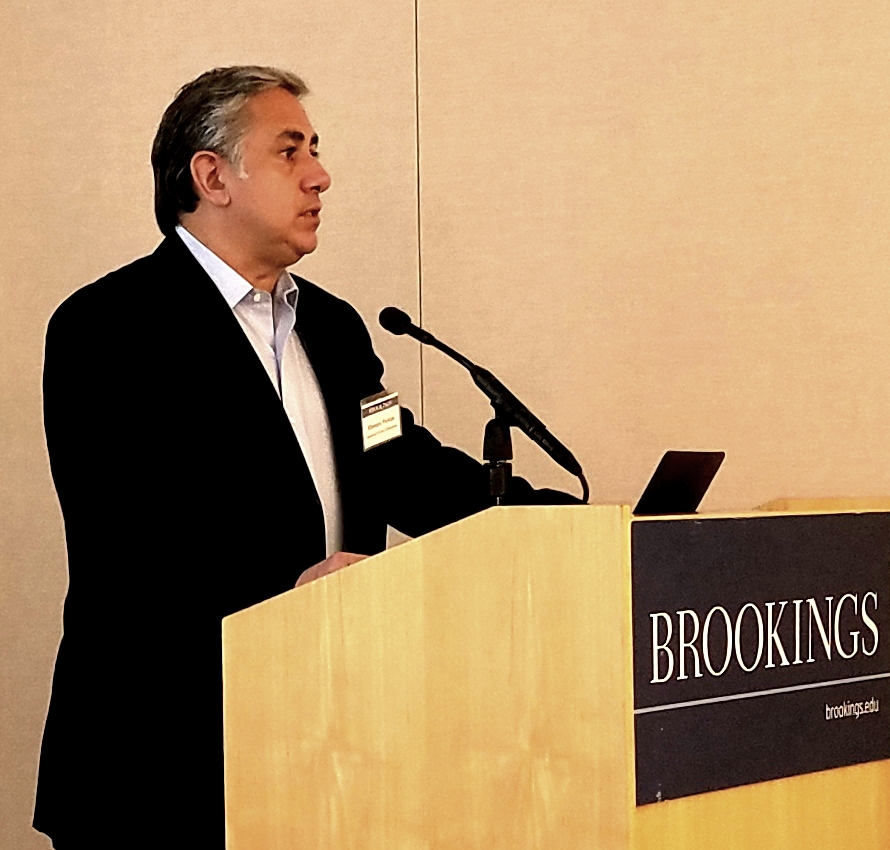

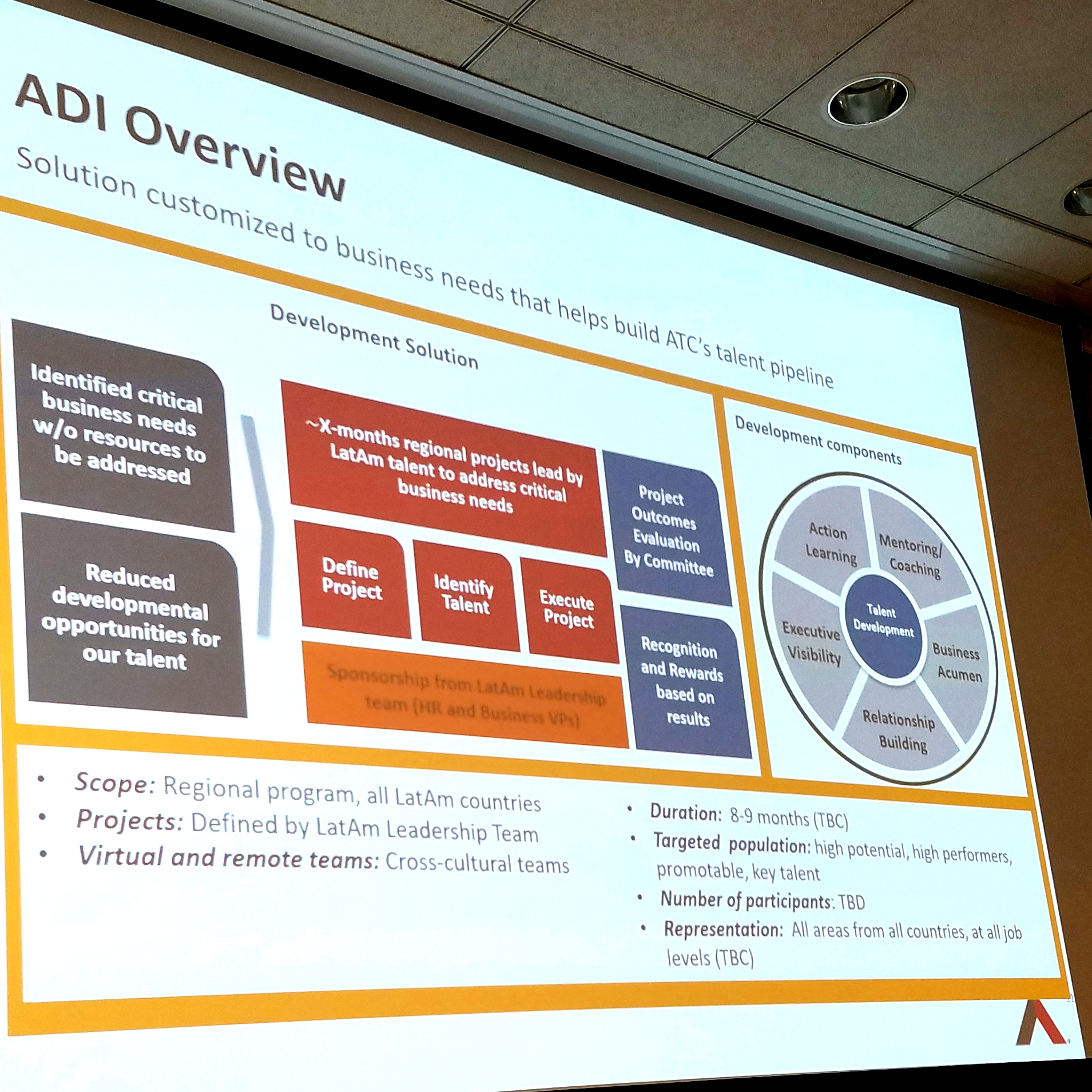

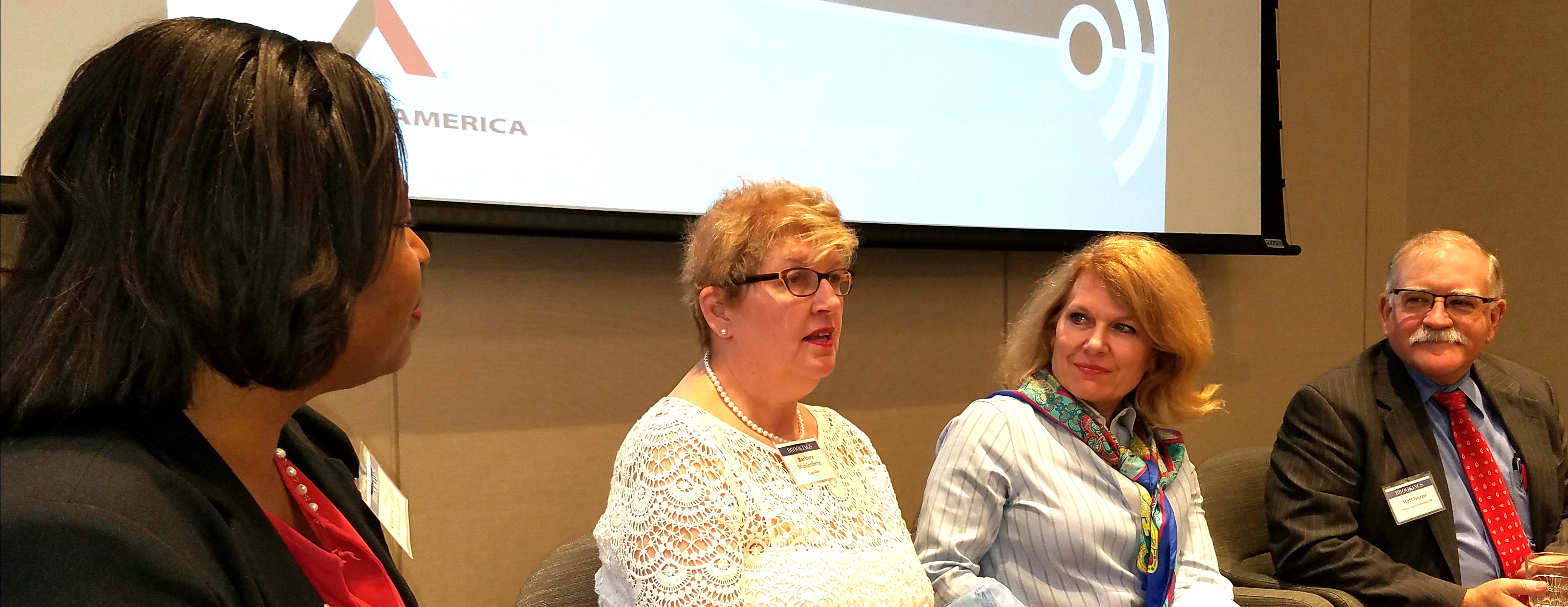
We want to help you
It’s all about who knows you  Reach-out and touch the world
Reach-out and touch the world
24/7/365 NON-STOP
+35,000 audience-sessions / reader-pageviews Y-T-D
+1.2 million since 2007 says Google analytics.
… get info text/talk (+1) 619.787.3100 or email publisher@GLOBALbusiness.media
TIME TO ENSURE A LIVING WAGE WORLDWIDE
Geoffrey Matthews,
Vice-President, Head of Corporate Total Rewards
Nestlé Group
Mr Matthews is a well-known writer and consultant on Employee Engagement, Rewards, Strategic HR and OD. He is also responsible for employee engagement and international mobility; and, he will be a featured thought-leader at the GLOBAL BUSINESS IQ / GLOBAL LEADERSHIP CONGRESS in Stuttgart, 11 June
In various countries there have been different initiatives to ensure that workers receive a Living Wage, but progress remains stubbornly slow. Just in the UK alone, only one-third of the top 100 listed companies have signed up with the Living Wage Foundation, and much more generally needs to be done across the globe. The UN 2030 Agenda for Sustainable Development calls for countries to “Promote sustained, inclusive and sustainable economic growth, full and productive employment and decent work for all.”
A Living Wage can contribute significantly to this. Without it, workers cannot provide for their own basic needs and those of their families, leaving them to face poverty and hardship.
Nestlé’s recent 2017 Nestlé in Society report shows how the company has made a Living Wage a reality for its employees across the world, through an exhaustive 3-year exercise covering 111 countries where it operates. This was a tremendous project, and I’m proud to have been part of this initiative while working at Nestlé.
Local legislation may be absent or insufficient to deliver a Living Wage, so if progress is to be made, employers need to take the lead in filling this gap. Paying a Living Wage not only shows that employers want to ensure better lives for their workers, it also shows consumers the organisation’s fairness in dealing with others. It makes business sense too in stimulating consumer demand and economic growth, so benefitting society as a whole.
While shareholder return is a focus for many companies, it’s vital that other stakeholders are not overlooked, especially those on the lowest incomes.
So far Nestlé and a few other pioneering companies have tackled this globally, but isn’t it time more employers took action here too? (Editor’s note: 1st published on LinkedIn March 28, 2018)
GDPR
May 25:
3 Steps for Everyone
The deadline for Global Data Protection Regulation (GDPR) readiness is fast approaching, and many are getting their affairs in order. Businesses around the globe will have to act now to ensure that they do not run afoul of the European Union’s new data protection legislation.
As we draw towards 25th May, every company that handles personal data should be looking internally to confirm compliance and improve their internal security procedures. Many, however, are still struggling to catch up with the new laws.
Get Informed
If not already done, now is the time to begin to research what GDPR means to you and your business. In human resources, a significant amount of personal data is frequently shared and processed to perform day-to-day functions. Educate yourself on what information the EU regards as ‘special’ as this needs to be handled with extra security, as a breach could lead to discrimination against the individual, and hefty financial penalties for those responsible.
The web is currently full of excellent resources which cover the possible impact of GDPR on virtually all industries across the globe. Remember, that much of your response needs to be risk-based, so take a careful and considered approach when researching the possible implications. What is right for one business may not be the same for yours, although you should always rest on the side of caution.
Review Your Practices
An extremely wise step for all organisations considering internal changes in response to the new legislation is to perform a full internal data audit. This process involves taking a fine comb to all of the data you store and process as a business, and recording what it is, where it came from, what it tells you, and who you share it with. The answers to these questions can then be used to form your next steps of response.
Holding a proper understanding of the personal data you store allows you to accurately consider how to change your processes going forward.
Do you stop collecting some data?
Do you scale back on your sharing with third-party service providers?
Do you need to be more explicit in your privacy and consent statements?
All of these questions and more will be greatly informed by this exercise.
Integrate Compliance
Finally, look towards the future, and consider how you can insulate your organisation from personal data-related problems of the future.
This will require some thought to how you can shift your current workflows to ensure compliance is at the core. GDPR places a considerable onus on data accountability, and you should too.
Ensure that you have the mechanisms in place to efficiently track the flow of private data into, through, and out of your business.
Every company should ensure:
- They have unambiguous consent to hold and process individuals’ personal data.
- They have the ability to completely delete personal data if requested by an individual
- They have the ability to securely transfer personal data to another location of company
- They have strict data security in place, with special data encrypted.
- They have processes in place for individuals to object to the use of their data
- They have a plan in place for reacting to and reporting personal data breaches
- They have appointed a data protection officer or ‘GDPR owner’ to drive data security
This can be a mammoth task, especially for any sizable business which handles significant quantities of personal information, such as those in the human resources sector.
Thankfully, there are now many technological offerings for all budgets on the market which are specially designed with these issues in mind.
As such, platforms offering full workflow management with internal tracking will soon become essential tools of the human resources professional.
This article was written by ReloTalent for GlobalBusiness HR News. If you would like to continue the conversation about GDPR, CEO and Co-Founder Sebastien Deschamps would be happy to discuss the issues raised in this article. Please email seb@relotalent.com
Guest Editorial
TAKE 2
minutes
Understand Why Xpat Gender Diversity Matters
… do something about it
… it’s time to accelerate
While some companies are making progress, the percentage of women in the expatriate workforce globally is still a paltry 14%, with best performing industries and countries lingering in the 20–30% range. Parity is a long way off.
- Having international experience is a pre-condition to reaching top managerial levels within many multinational companies. Furthermore, international assignments allow employees to develop essential skills and build a network that can boost their career.
- It’s not just a mobility question: the low participation of women in the assignee talent pool can put a brake on gender equality at leadership levels. It’s a strategic talent issue.
- Global Mobility should be part of the solution and help women break the glass ceiling rather than be part of the problem.
WHAT ARE THE CHALLENGES?
- There are unconscious biases in management and HR thinking that can influence the assignee selection process.
- The real degree of hardship for women in each location should be assessed objectively.
- Issues should be discussed when the talent pool is being created, not later in the selection process.
HOW TO MAKE PROGRESS?
CREATE AWARENESS AND REVIEW POLICIES FROM A DIFFERENT PERSPECTIVE
Bring the discussion about gender parity to the front and discuss how to move away from the traditional long-term male expatriate model.
REVIEW BENEFITS AND ALLOWANCES WITH DIVERSITY IN MIND
Without completely changing your policies, make sure that they include specific measures such as day care or spousal support to facilitate global mobility of women. Alternatively, provide the flexibility to re-purpose existing allowances or lump-sums that can used to address the needs of female assignees or minorities.
ENSURE PRACTICAL IMPLEMENTATION: COMMUNICATION, COACHING, AND MENTORING
All too often employees and their spouses are not aware of the support offered by the company. Talk openly about diversity in your policies and encourage internal discussion on this topic. Communicate about role models and success stories.
WORK CLOSER WITH DIVERSITY TEAMS
Make sure that the mobility team is in contact with the diversity team and can provide input on mobility issues. Gender parity and diversity are important topics for companies. It’s an opportunity for mobility teams to play a strategic role and help solve a major talent management issue.
MEASURE SUCCESS
Use workforce progression analyses to measure the career progression of female assignees, employee attitude surveys to capture female assignee feedback, as well as other indicators such as pay progression analyses that could indicate that there are gender gap issues in general.
click… review agenda, sign-up PARIS
PARIS
JUNE 14
Corporate Talent Policy Roundtable
leaders will include
Hervé Borensztejn, Managing Partner Europe, MidEast/Africa
VUCA meets META
“…Yes, we really do live in a volatile, uncertain, complex, and ambiguous world…but key business leaders are now meeting that challenge by accelerating performance: Mobilize, Execute, and Transform with Agility…”
Come learn a new approach to problem-solving
Paris, June 14 (click to register) http://bit.ly/2GLDF36
June 11th
STUTTGART, GERMANY
Invitation
1st Global Leadership / Global Business IQ™ Congress
Venue: Museum at Mercedes-Daimler
The global mobility of executives and employees is becoming increasingly important for corporations and international medium-sized companies. In the US, but also in Germany and other countries, this issue has long been a top priority.
Through a partnership with the US business portal, Global Business News, and it’s Publisher, Ed Cohen, a unique congress on this topic takes place for the first time in Germany on Monday, June 11th inside the Museum at Mercedes-Daimler.
We suggest you use the opportunity to obtain information on current trends and developments, and to exchange ideas with experts and colleagues.
Johannes Klemeyer (Managing Director of crossculture academy, President Globiana, Inc.),
Prof. Dr. med. Wilfried Mödinger (Leading The Future)
…………
Guest Editorial: European perspective
Fact-Check: Is mobility really an opportunity for employees?
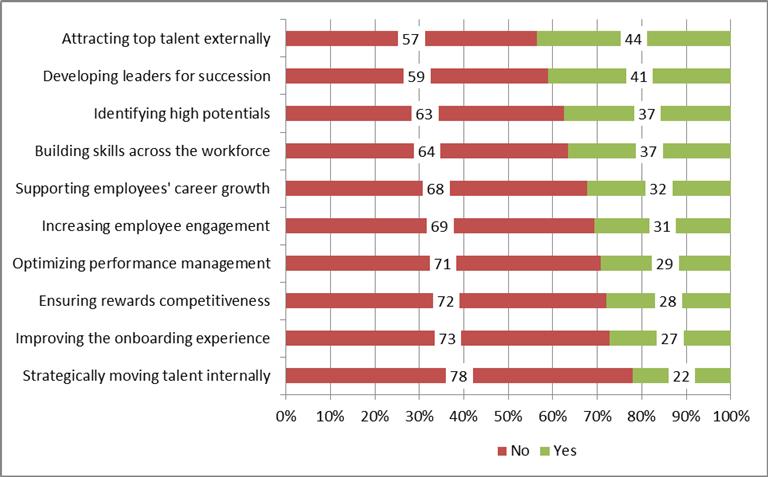 FIGURE 1 Source: Mercer’s 2017 Global Talent Trends Study
FIGURE 1 Source: Mercer’s 2017 Global Talent Trends Study
By
Olivier Meier, Mercer – Munich
Mr Meier is a Principal – Helping Companies Go Global; Consulting, Data/Technology to Support Talent Mobility.
Editor’s Memo: He will be a faculty-member June 11 at Global Business IQ™ in Stuttgart at the Museum at Mercedes-Daimler
A better alignment between global mobility and companies’ global talent agenda is a precondition for making mobility truly strategic and help companies achieve a significant return on investment with their international assignments.
Looking at the top talent trends and HR priorities, it is interesting to see the potential synergies and mismatches between the talent agenda and the realities of global mobility.
IS MOBILITY REALLY AN OPPORTUNITY FOR EMPLOYEES?
In the 2017 talent survey, opportunity to work abroad is at the bottom of the list of employment aspects that employees perceive as ways to improve their work situation.
This is partly explained by the fact that mobility for less qualified workers is viewed as constrained mobility – i.e. the risk of being the victim of job delocalization as opposed to being offered new opportunities abroad.
The mobility gap between international high flyers and the rest of employees who can be victims of job mobility or are not been considered for international assignments is widening.
This gap has an impact on career progression and might slow down workforce diversity progress (that’s the case with gender parity as discussed in the article about women on assignment.)
The second explanation is that mobility is not always leading to faster promotion in companies despite the hype and declarations of intention (developing leadership is one of HR’s priority and should in theory be supported by global mobility.)
On the contrary, mobility can impact negatively career perspectives by cutting high performers from their peers at the company’s HQ and from their business network or by creating a skill mismatch (skills developed during the assignment might no longer be relevant when back in the home country.)
Furthermore, the absence of global career management coordination could mean that managers might not be even aware of the past achievements of their employees abroad.
Tracking the career evolution of international mobile employees provide useful insights on the real value of international mobility to boost an employee’s career.
Are former expatriates promoted faster (mobility is clearly an accelerator)?
Are they promoted at the same pace as their local peers?
Or slower (mobility is a danger for the employee’s career)?
A disconnection between the official company message about expatriation (expatriation is good for you) and the realities of mobility (I am being passed over for promotion) could lead to attraction and retention issues.
RECOGNIZING THE VALUE OF LATERAL MOVES
Lateral moves (moving between job types as opposed to being promoted in the same type of job) are not viewed positively: only 14% of employees respond that it could improve their work situation.
Yet, the development of lateral moves – and their acceptation by employees – is critical for retention purposes and to improve skills in fast changing environment. The number of jobs at managerial level is limited and not all highly skilled and talented employees can make it to the top.
For a mobility perspective, the impact of this limit is even greater and partly explains repatriation problems. Companies cannot offer a guarantee to expatriates after their repatriation.
There are objectively not enough jobs of a certain level available in every single country. International assignments tend to increase the skillset of international employees and in some case accelerate promotion – but that leads to increased expectations and ultimately to a retention crisis when employees reach the bottle neck in the managerial path.
Lateral moves are important because they can ease the pressure by increasing the number of possible job options for employees.
In a context of fast workplace changes and digitalization, they are a way to develop new skills and maintain employability.
The future of work is about changing jobs and even career paths frequently as opposed to having a linear career progression.
But this kind of flexible career path can only work if there is a greater degree of recognition and acceptance of lateral moves by both employees and management.
From that perspective, finding ways to strategically moving talent within the company is rightly listed as a top HR priority.
…………………………………
YES or NO…
ASPECTS EMPLOYEES BELIEVE WILL IMPROVE THEIR WORK SITUATION
FIGURE 2: Source: Mercer’s 2017 Global Talent Trends Study
“Live” AUDIENCE
LEARNING
…CONNECT BETTER
Stuttgart June 11 STRATEGIC LEADER DEVELOPMENT
Paris June 14 BREXIT, NEW ECONOMIC ENGINE; META not VUCA
Toronto June 27 CANADA Foreign Direct Investment & Cross-Border Relocations™
Manhattan July 10 INNOVATION
Boston July 12 Global HR Business Partnering with Talent Mobility
Miami/LatAm August 2 Strategic Talent Mobility across LatAm gives 100% ROI
San Diego August 10 at MisterA’s; GLOBALLY MOBILE TALENT…Business and Relos
New York September INNOVATION
Chicago September INNOVATION
Washington October 4 INNOVATION
Seattle October 15 INNOVATION
Houston November
Dallas November
New Orleans
text/talk … (+1) 619.787.3100
or email publisher@GLOBALbusiness.media
Publisher’s memo
FREE TRADE
WHAT DO YOU KNOW ABOUT IT ?
Country governments do not restrict imports from, or exports to, other countries. Other barriers that may hinder trade include import quotas, taxes, and regulatory legislation. (source https://en.wikipedia.org/wiki/Free_trade
NAFTA
DO YOU KNOW ABOUT IT?
Click here to add your own text
ARE YOU GLOBAL READY?™
DRIVE ECONOMIC GROWTH
NEW WORKFORCE
GLOBAL CAREERS
TALENT LIFE-CYCLE
converging with
MOBILITY LIFE-CYCLE
DIGITAL MOBILITY
Grow global to thrive in the world we will be living in™
…………………….
……………………………….
………………………..
………………………………………





